- Home
- Tripp Ellis
Z Force 1: A Post-Apocalyptic Thriller (Infection Chronicles Book 2) Page 8
Z Force 1: A Post-Apocalyptic Thriller (Infection Chronicles Book 2) Read online
Page 8
The SR imaging allowed a real time view of soft tissue structures and organs. The technology had saved countless soldiers in the field. The medics loved it. It would give Steele an idea of just how bad the damage to the president was.
The imaging display on the tactical goggles was black and white, with an option to overlay vascular data in color. The shard of aluminum punctured the president’s upper left quadrant. Unfortunately it had punctured the peritoneal cavity and protruded into the stomach. Penetrating abdominal traumas were particularly nasty injuries and were often fatal. But, fortunately, the damage inflicted by this shard of aluminum was relatively minimal. No major arteries had been severed. No bone fragments had inflicted secondary damage.
“Does this hurt when I press here?”
The president grimaced as Steele pressed around on his abdomen. “Like hell.”
“You’ve got a little peritonitis.”
“Oh, is that all,” Johnson said, sarcastically.
“Inflammation of the abdominal cavity.”
“You going to get this chunk of metal out of me?”
Steele had provided plenty of battlefield trauma care during his years in the Army, but he was no surgeon. And right now, the president needed surgery.
“You’ve got two options. You can wait it out until we get you to a trauma center, or I can try to patch you up here.”
“Try? That doesn’t sound very reassuring.”
Steele shrugged.
“Have you ever done anything like this before?”
“I’ve seen my share of trauma patients.”
“That wasn’t exactly a yes,” the president noted.
“I think we should hold off, sir,” Susan said.
“Have you been in contact with an EOC?” Johnson asked.
“I spoke with Black Rock in Houston. But that was before the crash. I can’t get anyone on the line now.”
“So we don’t even know if there is an operational trauma facility that is accessible?”
Susan shook her head.
The president sighed, then pursed his lips. “Major Steele, it looks like my life is in your hands.”
14
A thin mist of sweat formed on Steele’s face. He had worked on plenty of soldiers before, but never someone of such political importance. Never the president. When a soldier dies, it’s a tragedy. When a president dies, the world can change. But the world already had changed.
“I’m going to up your dose of Neuromodix. That should eliminate your pain response until the surgery is complete.” Steele said. He took another vial, and injected the president. “Let me know if you feel any discomfort during the procedure, and we can further up the dose.”
The president nodded. Another wave of relief washed over him. He couldn’t feel a thing. “That is good stuff. I’ve never felt better.” The president smiled, blissfully.
The major scrubbed up, put gloves on, then placed a bio-monitor on the president. It fed his vital statistics directly into the display on Steele’s tactical goggles. Everything looked good. The president’s vital signs were stable.
Steele cleaned and disinfected the wound and the surrounding area. Then he grabbed three flexible white discs from the med-kit. They looked similar to suction cups. They had tubes connecting them to the VMX-9000 PSA, portable surgical assistant.
A red LED light encircled the top of the discs. The lights flashed for a moment, then turned blue—indicating they were operating properly. Steele adhered the discs to the skin surrounding the wound, in a triangular pattern. The display in his tactical goggles indicated the precise location. The LED lights turned green when the contact was secure.
The discs were nano scopes—small, remotely operated laparoscopes. They synced up to Steele’s goggles and the VMX-9000. He could control the scopes through a series of hand gestures and brainwave activity. His tactical goggles synced with the laparoscopic camera, and he could perform the surgery entirely by remote.
The nano scopes created a small laser incision in the skin. There was no bleeding, since the laser cauterized the wound instantly. Then the scopes extended, dissecting their way into the abdomen. It was an automated process, based on the SR imaging data that Steele had acquired from the tactical goggles. This system had saved countless lives in the field. It was the next best thing to a med-pod. It was like having a surgeon standing over your shoulder, telling you what to do.
Once the scopes were in position, Steele could clamp off any bleeding and cauterize the area. Then he was able to remove the offending piece of aluminum. After that, he addressed any residual bleeding. Then he began to debride the wound and remove debris. Suction from one of the nano scopes removed excess fluid. Then he used the scopes to clamp the perforation in the lining of the stomach together. He used a bonding gel to seal the puncture.
The bonding gel was a biopolymer that instantly fused tissue together. The tissue would subsequently grow into the polymer, leaching regenerative material. Polymer fused tissue was stronger, and more durable, than natural tissue.
Steele irrigated the area and explored for further wounds. When he was satisfied that everything had been taken care of, he used the same technique to repair the peritoneum and muscle tissue damaged by the puncture.
Then he retracted the laparoscopes and sealed the external laceration. The whole operation had taken less than 45 minutes.
“Is that it?” the president asked.
Steele wiped the sweat from his brow. It had seemed like a simple procedure for anyone watching. But it had been nerve-racking for Steele. And he wasn’t one to get nervous.
“That’s it,” Steele said. “Just take it easy. Don’t move around. You’re not going to feel any pain for the next hour or so. I don’t want you screwing up my handiwork. Got it?”
“Yes, sir,”the president saluted.
“You got blood on my couch,” Duke said.
Steele glared at him.
“I’ll buy you a new one, courtesy of the US government,” Johnson said.
“Nice work, Major,” Susan said. She had a look of pleasant surprise on her face. Her blue eyes sparkled. She was impressed—and Susan wasn’t easily impressed.
Steele snapped off the surgical gloves and threw them in the trash. Then he stepped outside the mobile home to get some air. Susan followed him.
“You know, I have to admit, I thought you were just another—”
“Dumb grunt?” Steele finished.
“I wasn’t going to put it quite so harshly.”
Steele chuckled. “You don’t seem like one to temper your speech.”
“You saved his life. Seems like this country owes you yet another debt of gratitude.”
“The computer did most of the work.”
“That’s not true. I couldn’t have done it. You’ve got some skill. Maybe you missed your calling?”
“I’m better at killing,” Steele said. It was true, he was better at killing. But something had changed for him back in the containment zone. He wanted to start measuring his life by how many people he helped, rather than how many he hurt.
“So I’ve seen,” Susan said.
Steele paused for a long moment. “You want to tell me why the president’s fighter escort fired on Air Force One?”
“I don’t know,” Susan said. “Some kind of vaccine induced psychosis?”
“Wishful thinking.”
“I can assure you, those pilots are thoroughly vetted.”
“Then your vetting process sucks.”
Susan didn’t want to admit it, but the virus ravaging the country was only one of their problems. At some point, she was going to have to address the possibility that a terrorist entity, or foreign government, was responsible for the attack on Air Force One.
“I think you need to reevaluate everything and everyone,” Steele said.
“I still think the Black Rock facility is our best bet.” Susan paused. “I’ll be honest. You’ve earned my respect, Major Steele. From now on, I
want your input. And if we get through this, you better believe you’re gonna get one helluva promotion.”
Steele smiled, “I’m retiring, Ms. Norton.”
“Call me Susan.” Her eyes glimmered at him. The two stared into each other’s eyes for a long moment.
Steele felt his pulse quicken. This was an attractive woman.
“I should probably get back inside and check on the president,” she stammered. Then she spun around and strutted into the mobile home.
Steele watched her strut. She had a perfect ass—and she knew Steele was staring at it.
At the edge of the clearing, more infected were approaching. The sun was setting over the horizon. The sky was bathed in brilliant hues of purple and orange as the sun’s rays cascaded across the clouds. The best sunsets are always after it rains, when the sky has parted a little.
It was going to be a long night with those things pawing at the mobile home—scratching at the corrugated metal siding, and growling incessantly.
15
The president kept the nuclear launch codes on him at all times. Called the Gold Codes, they were printed on a plastic card (affectionately referred to as the biscuit). Contained within the nuclear football was the COGSOP. Among other things, it listed every emergency operation center, their secure telephone numbers, and emergency access codes.
As well as a Secret Service code name, the president also had a personal identification code. It was used when contacting secure facilities from an unsecured line.
By this point in time, it was hard to tell who, if anyone, was running the country. The continuity of government plan laid out a specific succession of leadership. But the 98 page document didn’t take into consideration the possibility of simultaneous infection by a vaccination gone awry. A shadow government had long been in place, ready to take over in the event of a catastrophe. But since all the secure facilities were inoculated first, little, if anything, remained of the shadow government.
After several attempts to get through, President Johnson finally got an answer from an operator at the Black Rock facility in Houston. It was an unlisted secure line. Theoretically, no one without the COGSOP would be calling this line. But since the call was coming from an unsecured, and unknown, cell phone, the operator only said three words. “Identify and authenticate.”
“President Bill Johnson. Bravo, india, golf, delta, alpha, whiskey, golf, zulu, kilo, zulu, x-ray.”
“Stand by,” the operator said.
After a few moments, a man picked up the line. “Mr. President, this is Lt. Colonel Matthew Warburton. It’s good to hear your voice, sir.”
“Thank you, Lt. Colonel. Is your facility secure?”
“Yes, sir. We had some initial complications, but everything is under control now, sir.”
“Excellent. I need you to send a rescue team to my current location.”
“I’m sorry, sir. I’m afraid I can’t do that.”
“What do you mean, you can’t do that?”
“I’m under strict orders from Acting President Radcliffe not to divert any resources from this facility.”
“Vice President Radcliffe?”
“Yes, sir.”
“You realize, Lt. Colonel, you are speaking to the actual president of the United States?”
“Yes, sir. But, due to your situation, there may be the possibility that you are compromised. And therefore unable to faithfully execute your duties as commander-in-chief.”
Johnson clenched his jaw. He was seething. “Is Vice President Radcliffe at the facility now?”
“Yes, sir.”
“Let me speak with him.”
Warburton stammered. “Uh, he’s unavailable at the moment.”
“Make him available.”
“Yes, sir.”
Johnson was on hold for a long time. “You are not going to believe this shit,” he said to Susan.
“Should have picked me as your running mate.”
Johnson sighed.
Finally, Radcliffe came to the phone. “Bill, I’m so glad you are alright.”
“Cut the shit, Radcliffe. I’m safe. I’m not compromised. I want command back.”
“Now, Bill. You know the protocol as well as I do. Do you actually think I want this responsibility?” His tone was insincere. “Until we can verify your situation. I have to act as president. Hell, I’d come get you myself if I knew how to fly. But I don’t have a pilot, or the resources to mount a rescue operation. As acting president, my first priority is the safety and security of this great nation. As far as I know, this is the only functional emergency operations center.”
“I see why people don’t trust politicians.”
“Now Bill, that hurts my feelings. You get to this facility, and I will relinquish command back to you. Until that time, Godspeed, and God bless.”
“Have you talked to Petrov?”
A blast of machine gun fire crackled through the speaker. The president could hear yelling and commotion in the background.
“Bill, I’m gonna have to get back to you. We’ve got a bit of a situation here.”
The line went dead.
“Radcliffe? Radcliffe?” The president looked shocked. Then his face tightened. “That son-of-a-bitch.”
The president hung up the phone and sat up on the couch. He grimaced a little—the pain meds starting to wear off.
“Like I said, you should have picked me as your running mate.”
“We’ve got to get to Black Rock. I’m taking back control of the country.”
“It may not be that easy,” Steele said.
“What do you mean?” Susan asked.
“Raddclife may not be so quick to relinquish command,” said Steele.
“I have a feeling he might not be in command for much longer,” Johnson said.
Susan looked perplexed.
“I heard gunfire. I think they may have an infection problem.”
“I think you need to consider the very real possibility that none of this was an accident,” Steele said.
“What do you mean, exactly?” Susan said.
“You tested the vaccine before you deployed it, yes?”
“Of course,” the president said.
“With no adverse effects, correct?”
“We wouldn’t have deployed it otherwise.”
“You don’t find it odd, that suddenly mass infection is occurring from the inoculations?”
The president and Susan were eager to see where Steele was going with this.
“It was an inside job,” Steele said. “The vaccine deployed was different than the one you tested. It was a terrorist attack. That was clear when the F-45 escort fired a sidewinder missile at us.”
“That would mean a deep level insertion of sleeper operatives in the highest level of government,” Susan said, skeptically.
“How else do you explain it?” Steele said.
Susan exchanged glances with Johnson. They knew what Steele was saying was plausible.
“Do you think Radcliffe orchestrated this?” Susan asked.
“Radcliffe is power hungry, but he’s not that smart. He’s an opportunist,” the president said. “I think he’s just taking advantage of a situation.”
“Then who?” Susan asked. “The Russians?”
“Possible,” the president said. “But what do they stand to gain? At this point, our economies are too intertwined.”
“You think it was radical terrorists?” Susan asked Steele.
“Domestic terrorists,” Steele said. “There are a lot of people who are not happy with the direction this country is going. They want radical change. And they want it now. There are any number of domestic paramilitary organizations that fit the profile. Fringe groups that want to overthrow the government and start from scratch. They level the country, then rebuild it their way.”
Susan’s face tensed. The NSA had been tracking dozens of homegrown paramilitary organizations. Extremists from both the left and the right. Well finan
ced, well trained, and well armed. They operated as independent, autonomous cells, with no apparent centralized command structure. Every now and then, a group would claim responsibility for a bombing, or cyber attack. Sometimes they would even fight each other. But there had been no chatter detected indicating a large-scale national assault. Most of these groups had websites and manifestoes and spewed propaganda—but it was mostly considered just talk. There was the occasional standoff at a compound, or a land dispute, which usually ended badly for the organization in question. For the most part, the security agency considered these groups backwater anarchists. And not real threats.
Susan was kicking herself for not paying it more attention. She had been more focused on foreign threats. Emerging nuclear powers and radical fundamentalists.
Steele glared at Duke. The arms that he was stealing and reselling were most likely going to these types of organizations.
“Red Viper,” Susan said. “It’s the largest domestic terrorist group. “They’d be the only group capable of something of this scale. One of their stated goals is the overthrow of democracy. Replaced by an authoritarian government.”
“You mean a tyrant,” Steele said.
“Cassandra Rawlings is their leader. They see her as a hero.”
“And you didn’t think she was worth keeping an eye on?”
“Like I said, we haven’t received any intelligence that would indicate a threat,” said Susan. “Do you know how many groups are out there every day, advocating for the overthrow of the US government? Besides, this is all just speculation at this point.”
Duke pursed his lips. He hesitated a moment. Guilt washed over his face. “I think,” he stammered, “but I can’t be sure, I heard mention of Red Viper. Didn’t give it much thought though.”
Steele scowled at him again.
“How was I supposed to know that they were a terrorist group?” Duke said. “I had no idea what they were going to use these weapons for.”
“Right, because people buy surface to air missiles for self defense,” Steele said.

 Wild Honor
Wild Honor Wild Gold
Wild Gold Wild Secret
Wild Secret Wild Killer
Wild Killer Wild Heart
Wild Heart Wild Crown
Wild Crown Wild L.A.
Wild L.A. Wild Fury
Wild Fury Wild Surge
Wild Surge Wild Riviera
Wild Riviera Wild Tide
Wild Tide Wild Rage
Wild Rage Wild Captive
Wild Captive Wild Spring
Wild Spring Wild Ocean
Wild Ocean Wild Break
Wild Break Wild Case
Wild Case Wild Venom: A Coastal Caribbean Adventure (Tyson Wild Thriller Book 31)
Wild Venom: A Coastal Caribbean Adventure (Tyson Wild Thriller Book 31) The Zero Code (Max Mars Book 3)
The Zero Code (Max Mars Book 3) Wild Justice
Wild Justice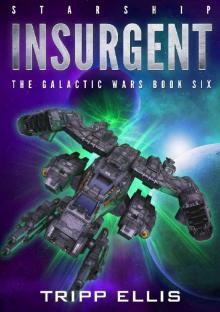 Starship Insurgent (The Galactic Wars Book 6)
Starship Insurgent (The Galactic Wars Book 6) Wild Rain
Wild Rain Siege on Star Cruise 239
Siege on Star Cruise 239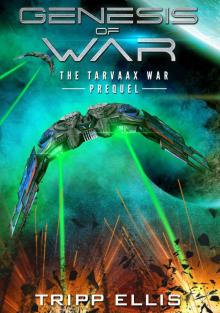 Genesis of War
Genesis of War Blade of Vengeance (Max Mars Book 2)
Blade of Vengeance (Max Mars Book 2) Starship Revenant (The Galactic Wars Book 3)
Starship Revenant (The Galactic Wars Book 3) Starship Valor (The Galactic Wars Book 5)
Starship Valor (The Galactic Wars Book 5) The Orion Conspiracy (Max Mars Book 1)
The Orion Conspiracy (Max Mars Book 1)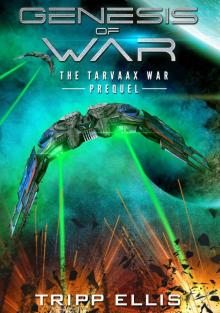 Genesis of War: A Military Sci-Fi Novella (The Tarvaax War Book 3)
Genesis of War: A Military Sci-Fi Novella (The Tarvaax War Book 3) Edge of the Abyss: A Space Opera Novella (Max Mars Book 4)
Edge of the Abyss: A Space Opera Novella (Max Mars Book 4)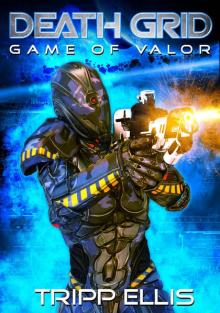 Death Grid_Game of Valor
Death Grid_Game of Valor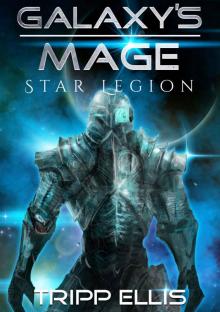 Star Legion
Star Legion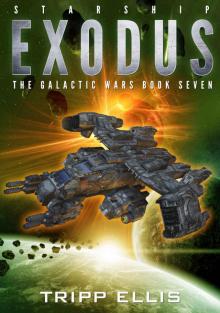 Starship Exodus (The Galactic Wars Book 7)
Starship Exodus (The Galactic Wars Book 7) Starship Desolation
Starship Desolation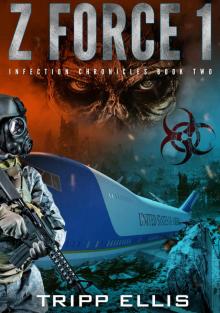 Z Force 1: A Post-Apocalyptic Thriller (Infection Chronicles Book 2)
Z Force 1: A Post-Apocalyptic Thriller (Infection Chronicles Book 2) Search for Honor (The Tarvaax War Book 2)
Search for Honor (The Tarvaax War Book 2) Valkyrie (The Galactic Empire Book 1)
Valkyrie (The Galactic Empire Book 1)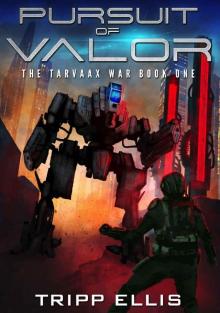 Pursuit of Valor (The Tarvaax War Book 1)
Pursuit of Valor (The Tarvaax War Book 1)